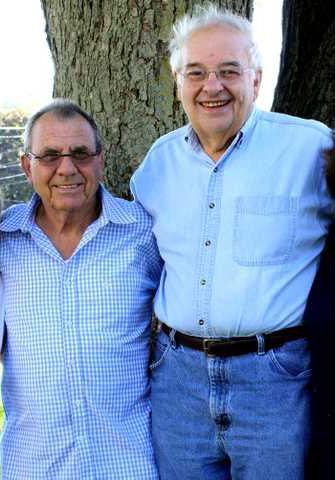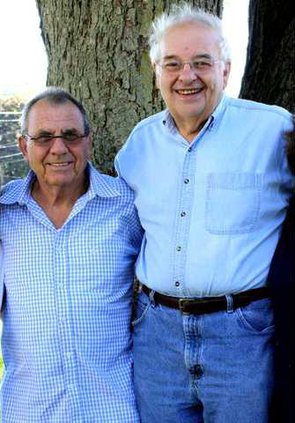SHULLSBURG—Two men who beat the odds and survived the World War II Holocaust concentration camps in Holland reunited after 67 years apart.
Louis Landau and Mike (Malte) Katz knew each other as children in the Westerbork and Liebenau concentration camps in Holland. They were playmates for approximately two years while living in the concentration camps with their mothers in 1943-44.
In 2008 Amy Zembroski, the daughter of Louis’ friend Phyllis Sonsalla, asked to interview Louis for a World War II class project at University of Wisconsin-Whitewater. She told Louis’ story about life in the concentration camp, mentioning his friend Malte.
The project was posted online and in September 2010, while living in Israel, Mike was researching the concentration camps and uncovered Louis’ story on Zembroski’s Web site. Mike read his and his mother’s names in Louis’ stories and contacted Zembroski to reconnect with Louis. The men were able to catch up via e-mail and Skype. Then, earlier this month Mike and his wife, Ora, made a visit to Shullsburg to spend time with Louis and his wife, Ellie.
“It was a once in a lifetime experience I didn’t expect to happen,” Louis said. “It has been so exciting, a thrill. Knowing that he survived is one of the big things. So many lost their lives in these places. We were four Holocaust survivors [Louis, Mike and their mothers] and we knew each other.”
Louis remembers many details of his experiences in the concentration camps. Mike was three years younger than Louis and doesn’t remember very much, nor did his mother talk about the experience after they were freed.
Both had a means to escape execution.
The ticket out
Before Louis was born, his grandfather stayed 10 years in America to earn his citizenship. When he passed away, his citizenship was passed on to one of his sons, and Louis’ father, Ernst, just before Germany declared war on Holland in 1942. Louis was 6. The American citizens were told to leave because Europe wasn’t safe anymore.
“My father didn’t want to leave my mother and me, but my mother talked him into leaving,” Louis said. “We stayed with my grandparents. My mother planned to go to America once we received our papers. Until then we were trapped in Holland.”
Louis said he and his mother, Pauline, both of Jewish descent living in Holland, were sent to the Westerbork concentration camp in Holland where Dutch-speaking people were imprisoned and executed. It was there that he met Malte and formed a friendship with the boy who was several years younger than him.
Louis said he and his mother were listed to be executed seven times, but each time the room was full before they got there. On the seventh time his mother produced a paper revealing that Louis’ father was an American citizen, making Louis an American citizen. Pauline received this paper from Ernst through the Red Cross packages that delivered food and supplies to the concentration camp.
Malte was in the same situation as he was British. The two children and their mothers were sent to a prisoner of war camp at a nunnery in Liebenau near the Switzerland border in Germany.
Pauline became severely ill while at Liebenau. The Nazis set up a prisoner exchange with America for Germans in Iowa; Louis said the Nazis probably figured the sick woman wouldn’t live much longer and they wanted the German prisoners released to help fight the war.
“That is how we got to America,” Louis said. “Little did they know that my mother was determined to fight the illness and lived to be 81 years old.”
Louis said he and his mother first saw the Statue of Liberty on June 6, 1944, after a 10-day ride on the ship, The Gripsholm, to America.
Ellie said Louis’ father was very actively working to get Louis and Pauline out of the camps. Louis saved the correspondence from his father, documenting the efforts that were made.
Reunited
After 67 years of not knowing what happened to his childhood friend, technology allowed Louis to reconnect with Mike.
“She [Zembrowski] had no idea what she was getting me into,” Louis said. “All of this came about because Amy needed a World War II topic for school.”
Mike said while reading on Zembrowski’s site he knew he was the boy that was mentioned because he had a copy of the same picture that was on the Web site, one that Louis let Zembrowski use on the site. The picture is of five women lined up in front with Mike standing on a wall in the background.
“I’m retired now and in my free time I have started thinking about the war,” Mike said. “ I searched for the name of the camp in Holland and when Amy’s site came up, I read my name and was shocked. I have an album of photos from that period and one of the pictures is the same as one on the site.”
Louis said he and Ellie searched for signs of Mike in England years after the war ended, but they didn’t know until they reconnected with Mike that he moved to Israel.
“We found our new family,” Mike said. “It was like we came home. Louis is reminding me of stories since he was older.”
While Mike and Ora were in Wisconsin, Louis and Ellie took them to several interesting locations in Dubuque, Galena and Shullsburg.
“I found somebody who I went through hell with,” Louis said. “We lost contact for over 60 years, but he’s here talking to me.”
Mike said 80 percent of the Jews in Holland were exterminated.
To make sure people don’t forget, Louis gives a presentation about his experiences with the Holocaust every semester at University of Wisconsin-Platteville. He has also presented at several schools and for many service groups. His next presentation is at the library in Shullsburg on Oct. 19 at 7 p.m.
“I unfortunately remember too much,” Louis said. “I talked with Mike while he was here, sometimes all day and all night. It was so much fun to see him because I remember him as a kid. He learned a lot from his experience of being here. It was like I’ve known him my whole life.”
Another connection made
Zembrowski’s Web site led to another connection to Louis.
In 2009 Louis received an e-mail from a woman in Holland saying that her grandmother played with Louis as a kid before the war. The woman was a neighbor to Louis’ grandparents.
Through research to investigate how his grandparents died, Louis eventually learned that his grandparents were sent to a concentration camp and were executed in 1943. Louis was unable to find where they were buried, but saw where they died. A monument of the names of Jewish people from Winterswijk, Holland, who died in World War II was erected in 2010. It contained the names of Louis’ grandparents.
“When they left for the camp, they threw a post card out the window,” Louis Landau said. “It was addressed to the neighbors across the street. It said they were going to meet their daughter and grandson at camp.”
Louis Landau now has a picture of that post card.
Web site reunites childhood friends from Holocaust





